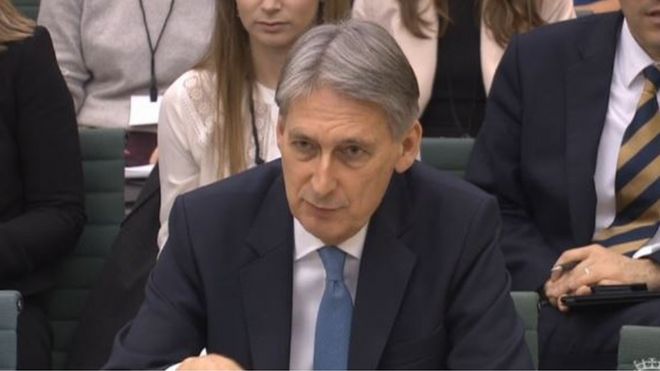Chancellor Philip Hammond has backed a transitional deal for Brexit saying it would be "helpful" to allow longer than two years for the UK's EU exit.

Mr Hammond told the Treasury select committee that there was an "emerging view" that having longer would tend towards a "smoother transition" .
There would be "less risks of disruption" including "crucially risks to financial stability", he added.
However, both business and government would have to make changes, he said.
His comments are being seen as the strongest signal yet from the government that the Brexit process could take a lot longer than the two years needed for the official Article 50 exit process to be completed.
On Monday the Treasury Select Committee called for written submissions on transitional arrangements as part of its inquiry into the UK's future economic relationship with the EU.
It defines "transitional arrangements" as being "any arrangement that takes effect between the point at which the UK formally leaves the EU... and the point at which the UK's final, settled relationship with the EU becomes effective."
Customs arrangements
"I would not want anybody to think this is just about financial services," Mr Hammond told MPs.
"For example, depending on what future customs arrangements are between the UK and European Union, there could be significant physical infrastructure changes that need to be made at ports of entry and exit, not only in the UK but on continental Europe as well," he added.
He said there could also be a need to train large numbers of people in anticipation of a "much more intensive process at borders.
"So it's not just the business sector, it's also the government sector that has to think about how long it takes to make changes, hire people, train people, introduce IT changes.
"And I think the further we go into this discussion, the more likely it is that we will mutually conclude that we need a longer period to deliver," he added.
Analysis: Kamal Ahmed, BBC business editor
The government position is becoming clearer.
By the end of the Article 50 timetable - which Number 10 believes will be March 2019 - the UK will have legally agreed to leave the EU.
But it will not be like jumping off a cliff edge.
Rather, Britain and the EU will still have a close relationship, with many EU rules remaining in place.
They will slowly be unravelled over subsequent years as Brexit is made a reality.
Committee chairman Andrew Tyrie said it sounded like two years was the "bare minimum, we're probably going to need more."
Mr Tyrie also said he had received briefings from firms about the need for transitional arrangements, including one from a major financial institution which said insufficient time to adjust could result in severe disruption to client services, causing financial instability and significant cost to the wider economy in Europe and globally.
Mr Hammond said he was also hearing about concerns in this area, particularly from the financial services sector.
Later he added that there were "compromises between the political will to get things done and to move on and the bureaucratic and/or business desire to have the largest period possible to make any change".
No comments:
Post a Comment